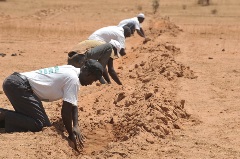The Hand-in-Hand (HiH) Initiative is FAO's evidence-based, country-led and country-owned initiative to accelerate agricultural transformation and sustainable rural development. The Initiative aims at:
- Increasing the quantity, quality, diversity, and accessibility of nutritious foods available in food markets located in countries where national capacities and international support are limited, and/or in countries facing humanitarian crises;
- Identifying opportunities to raise incomes and reduce rural people's vulnerabilities.
To address the challenges of timeliness, granularity, data gaps, and automation of analysis for quicker insights, the Data Lab supports the work of the HiH by:
- Conducting agricultural production data collection using text mining tools in contexts where little data are available, typically in the HiH priority countries and at a sub-national level (different types of administrative divisions);
- Using a big data approach to produce vulnerability maps in countries in crisis where up-to-date poverty maps are not available.

Agricultural production data at a sub-national level
The Data Lab collects agricultural production data by means of text mining to fill the data gap in contexts where little data are available. Such data are then summed up in order to create an overview of agricultural production at the national level and validated against the information contained in FAO's database on food and agriculture statistics (FAOSTAT). This activity contributes to the work of the Hand-in-Hand (HiH) Initiative, as it helps fill the data gaps for the countries that are part of the HiH initiative and disseminates the data on the HiH-GIS platform.

Vulnerability Maps
By using novel data science methods, the Data Lab has created maps of living conditions for countries where it was impossible to use standard approaches due to the unavailability of data from surveys/censuses in the most recent years.
